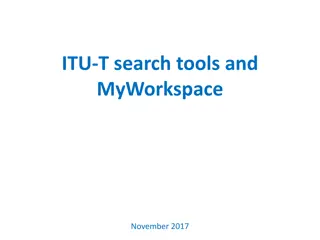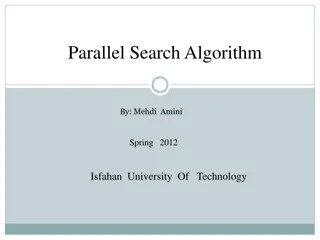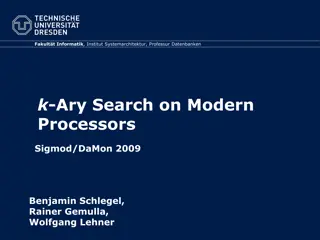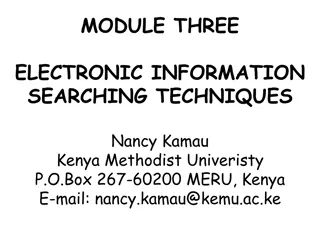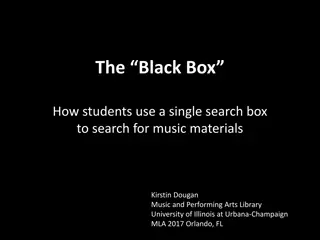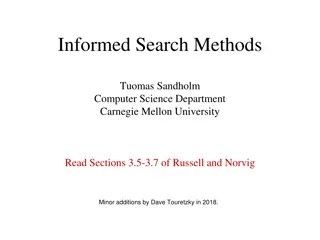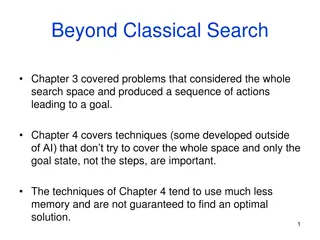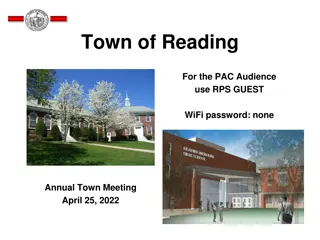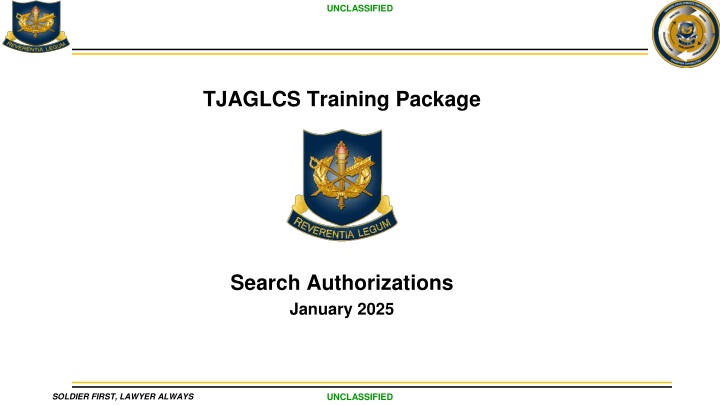
Understanding Search Authorizations in Military Law
Explore the process of authorizing searches in military law, including the role of commanders and probable cause. Learn about the Fourth Amendment protections and who can authorize a search. This training package provides valuable insights for legal professionals.
Download Presentation

Please find below an Image/Link to download the presentation.
The content on the website is provided AS IS for your information and personal use only. It may not be sold, licensed, or shared on other websites without obtaining consent from the author. If you encounter any issues during the download, it is possible that the publisher has removed the file from their server.
You are allowed to download the files provided on this website for personal or commercial use, subject to the condition that they are used lawfully. All files are the property of their respective owners.
The content on the website is provided AS IS for your information and personal use only. It may not be sold, licensed, or shared on other websites without obtaining consent from the author.
E N D
Presentation Transcript
UNCLASSIFIED TJAGLCS Training Package Search Authorizations January 2025 SOLDIER FIRST, LAWYER ALWAYS UNCLASSIFIED
UNCLASSIFIED The information provided throughout this training aid does not, and is not intended to, constitute legal advice; instead, all information, laws, statues, content, and materials for this training aid are for general informational purposes only. This training aid may not constitute the most up-to-date legal or other relevant legal information. Judge Advocates need to conduct their own due diligence through independent further legal research on any specific legal issue contained in this training package. No reader, user, or trainee of this product should act or refrain from acting based on information from this training aid without first seeking legal advice from an attorney in the relevant jurisdiction. SOLDIER FIRST, LAWYER ALWAYS UNCLASSIFIED 2
Roadmap The So What Who Can Authorize a Search (remember, seizure is different) Probable Cause Inspections / searches
The So What The Exclusionary Rule Understand a commander s authority to order searches and seize property Understand the process of authorizing searches and seizures Spot the issues, ask the right questions, and make the best decision
Fourth Amendment, U.S. Const. The right of the people to be secure in their persons, houses, papers, and effects, against unreasonable searches and seizures, shall not be violated, and no Warrant shall issue, but upon probable cause, supported by Oath or affirmation, and particularly describing the place to be searched, and the persons or things to be seized.
Who can authorize a search? If supported by probable cause, the following individuals can authorize a search: Commander Must be neutral and detached (impartial) No delegation* Own the area Military Magistrate Military Judge * The ability to authorize a search can devolve from a commander to a subordinate the question is whether the subordinate is functioning as a commander while the commander is absent from command.
Neutral and detached? M.R.E. 315 requires a commander issuing a search to be impartial The participation of a commander in investigative activities in furtherance of command responsibilities, without more, does not require a per se disqualification of a commander from authorizing a search under M.R.E. 315.
How can the commander authorize? Search authorization express permission, written or oral, issued by competent military authority to search a person or an area for specified property or evidence or for a specific person and to seize such property, evidence, or person. It may contain an order directing subordinate personnel to conduct a search in a specified manner. M.R.E. 315(b)
Four main Fourth Amendment concepts Proper Authorization Expectation of Privacy Probable Cause Reasonable Reasonable
Is there a Reasonable Expectation of Privacy Most govt property Off-base home NO REP REP Govt office, computers, e-mail
Barracks Rooms A Soldier DOES have a reasonable expectation of privacy in their barracks room, but it is not as great as the expectation would be in someone s home.
On-post versus off-post housing On post: Commander, military magistrate, or military judge can authorize a search of on-post housing, regardless of whether it is privatized Off post: Commander has no legal authority to authorize a search.* * Consult the SOFA for OCONUS locations. Military Rule of Evidence 315(c)(4) allows search authorizations of nonmilitary property in a foreign country.
Search authorizations For a warrant, it must be in writing, and it must be under oath Search authorizations can be verbal, can be granted over the phone and no oath is required. In writing is a best practice. The fact that sworn information is generally more credible and often entitled to greater weight than information not given under oath should be considered. AR 27-10, para. 8-7 Should be executed within 10 days after the date of issue. Inventory should be taken as soon as practicable.
Probable Cause A search authorization issued under this rule must be based on probable cause. Military Rule of Evidence 315(f)(1) What does probable cause mean? Probable cause to search exists when there is a reasonable belief that the person, property, or evidence sought is located in the place or on the person to be searched. Military Rule of Evidence 315(f)(2)
Probable Cause A fluid concept turning on the assessment of probabilities in particular factual contexts not readily, or even usefully, reduced to a neat set of legal rules. - Illinois v. Gates, 462 U.S. 213 (1982) It is not a technical standard, but rather is based on the factual and practical considerations of everyday life on which reasonable and prudent men, not legal technicians, act. - United States v. Leedy, 65 M.J. 208 (C.A.A.F. 2007)
A little more helpful? Make a practical, common-sense decision Do not have to rule out a suspect s innocent explanations for suspicious facts PC standard requires a person of reasonable caution could believe that the search may reveal some evidence of a crime Free to draw reasonable inferences from the facts Sufficient nexus must be shown to exist between the alleged crime and the specific item to be seized
Probable Cause Consider the totality of the circumstances ASK QUESTIONS Think about: Staleness of the information Veracity of the informant (Anonymous?); reason to lie? Basis of knowledge (HOW do we know this information? Second- or third-hand?)
PC Hypo #1 Specialist Allen tells 1SG that SPC Brady talked about how his buddies smoked pot when he was home on leave last month. Specialist Brady is a self-proclaimed Deadhead, he is a big fan of the Grateful Dead, Phish, and Dave Matthews Band. No one has ever seen SPC Brady smoke pot, say he ever smoked pot, or even say he would like to smoke pot.
PC Hypo #2 - CID investigating vandalism of a barracks building. Involved setting a fire and spray-painting obscene images on the walls. - Accused gives a statement to CID where he denies any involvement. - CID is seeking a Search Authorization for Accused s phone because young people always have their phones on them. - Do you grant the search authorization based on that rationale alone? - What other information would you want to know? How would you get it?
Inspections Outside of the military: inventory / administrative searches are excepted from the probable cause requirement (e.g. inventory of car after impound, search of person upon booking, etc.) Within the military: Commanders can inspect, BUT if the inspection is for the primary purpose of obtaining evidence for use in a trial by court-martial or in other disciplinary proceedings it is not an inspection If the inspection is to locate and confiscate weapons or contraband, the burden is on the Government to show by clear and convincing evidence that it was an inspection.
Inspections Primary purpose must be to ensure the security, military fitness, or good order and discipline of the unit. Military Rule of Evidence 315(b) The inspection cannot be a pretext or subterfuge for an otherwise illegal search.
Hypo #3 - Your commander receives information that SPC Brady is growing weed in the barracks and selling it. - He got this information when he was walking past the gazebo and a bunch of Soldiers were standing around smoking cigarettes and talking. You tell him that you are not sure this rises to probable cause for a search. - He wants to order an inspection. (He uses sarcastic air quotes). - What do you tell him? What other information do you want to know?
Inspections Valid inspections (normally) Health and welfare TA-50 layout Gate inspections
References M.R.E. 311 Evidence obtained from unlawful searches and seizures M.R.E. 312 Body views and intrusions M.R.E. 313 Inspections and inventories in the Armed Forces M.R.E. 314 Searches not requiring probable cause M.R.E. 315 Probable cause searches M.R.E. 316 Seizures Caselaw (CAAF Opinion Digest)
UNCLASSIFIED Need Training Materials? Have Training Materials? Questions? Contact Us! TJAGLCS-training@army.mil SOLDIER FIRST, LAWYER ALWAYS UNCLASSIFIED










